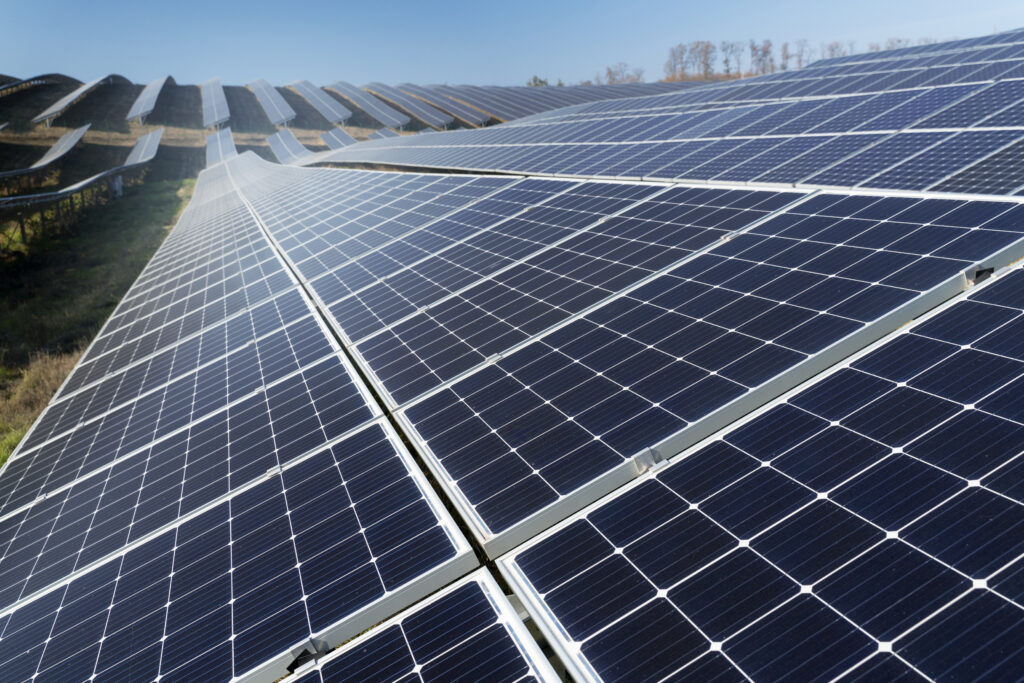Harnessing the power of AI in solar energy management marks an innovative shift towards unprecedented efficiency and sustainability. In an era where renewable energy sources take center stage, the fusion of artificial intelligence and solar energy has emerged as a transformative force. AI’s capacity for data analysis, predictive modeling, and real-time optimization has redefined the landscape of solar power utilization.

AI in Energy
Link : https://www.datategy.net/2023/03/01/ai-in-energy-revolutionizing-peak-time-prediction-and-management/
In recent years, the fusion of artificial intelligence (AI) and solar energy has evolved, presenting innovative solutions to enhance solar power utilization. AI’s ability to analyze data, predict patterns, and optimize operations has transformed how we manage solar energy systems, unlocking their maximum potential for efficiency and reliability.
Fusion of AI and Solar Energy
Solar energy, abundant and renewable, has seen remarkable advancements in technology over the years. However, its efficiency has been dependent on various factors, including weather conditions, location, panel orientation, and maintenance. This is where AI steps in, revolutionizing the way we harness and manage solar power.
- Predictive Analytics: Maximizing Solar Output
AI algorithms can analyze vast amounts of data from weather patterns, historical solar irradiance, and geographic information to predict solar energy production. By using predictive analytics, AI can optimize the positioning of solar panels, adjusting their tilt and orientation in real-time to capture the maximum sunlight throughout the day. This precision leads to increased energy production and greater overall efficiency.
Smart Energy Management
Link : https://solarbuildermag.com/featured/artificial-intelligence-can-expand-solar-energy-here-are-7-great-examples/
- Maintenance and Performance Monitoring
Monitoring the performance of solar panels is crucial for their longevity and efficiency. AI-powered systems can continuously monitor panels, detecting irregularities or malfunctions in real-time. Through predictive maintenance, AI can anticipate potential issues by analyzing data trends, preventing breakdowns and minimizing downtime. This approach significantly reduces maintenance costs and ensures optimal performance.
- Harnessing AI for Tailored Solar Solutions
In the realm of solar energy management, the synergy between Artificial Intelligence (AI) and solar technologies marks a transformative leap forward. With AI’s ability, we can precisely determine the optimal placement and capacity of solar panels for individual clients. By analyzing factors like electricity bills and consumption patterns AI can generate detailed reports showcasing the potential solar panel installations and the corresponding energy savings. This fusion not only streamlines decision-making processes for clients but also enhances the efficiency and effectiveness of solar energy adoption, strengthening AI’s pivotal role in advancing sustainability initiatives.
- Grid Management and Energy Distribution
AI plays a pivotal role in grid management and energy distribution by optimizing the integration of solar energy into existing power grids. AI algorithms can predict energy demand, manage fluctuations in supply. This capability aids in stabilizing the grid, and enhancing overall grid efficiency.
Advancements and Future Prospects
Recent advancements in AI and machine learning have driven innovations in solar energy management further. Technologies such as machine vision, IoT (Internet of Things), and blockchain are being integrated with AI to create smarter and more autonomous solar energy systems.

The promising future of AI
Link : https://halcolenergy.com.au/solar-news/9-ways-ai-is-revolutionising-the-solar-energy-industry/
- Machine Vision
Machine vision, powered by AI, enables precise inspection of solar panels, identifying defects or damage that might obstruct their performance. Drones equipped with AI-driven cameras can conduct aerial inspections, allowing for rapid and accurate assessment of large solar farms, significantly reducing inspection time and costs.
- Internet of Things(IoT) and Data Analytics
The integration of IoT devices with AI facilitates real-time data collection from solar panels and surrounding environmental factors. This data, when analyzed using AI algorithms, provides insights into energy production patterns, enabling better decision-making for optimization and maintenance.
- Blockchain for Energy Trading
Blockchain can help manage the integration of solar energy into the existing power grid, by providing real-time data on energy production and consumption. This would help ensure that the grid is stable and reliable, even with the varying nature of solar energy.
Conclusion
While the integration of AI in solar energy management offers tremendous benefits, it also presents challenges and ethical considerations. Issues related to data privacy, cybersecurity, algorithm biases, and the displacement of jobs in the traditional energy sector require careful consideration and regulation as AI adoption in solar energy becomes more widespread.
The synergy between AI and solar energy management holds tremendous promise for a sustainable and greener future. With continuous advancements, innovations, and responsible implementation, AI will play an increasingly integral role in maximizing the efficiency, reliability, and accessibility of solar power. As we navigate the complexities of energy transition, the fusion of AI and solar energy stands as a beacon of hope, driving us towards a more sustainable and eco-friendly energy landscape.
Join our SafEarth marketplace to explore your options and buy your solar system from qualified installers in your area to make the switch easy.


you are truly a just right webmaster The site loading speed is incredible It kind of feels that youre doing any distinctive trick In addition The contents are masterwork you have done a great activity in this matter